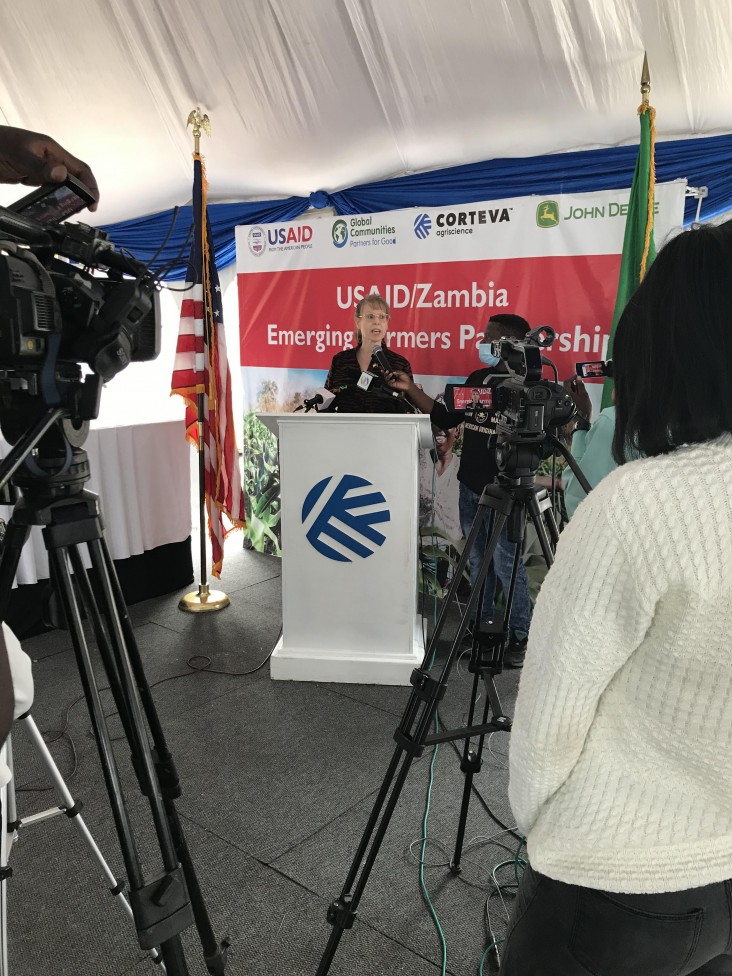Speeches Shim

Minister of Agriculture Honorable Michael Katambo,
Global Communities COP Nobel Moyo,
Corteva Country Director Samson Nyendwa,
Afgri Representative Rayno Van Niekerk,
Ladies and Gentlemen,
All protocols observed.
It is a great honor for me to be here with you at the signing of this memorandum of understanding for the Emerging Farmers Partnership project between USAID, Corteva Agriscience, John Deere, and Global Communities. This MOU represents some of USAID’s most important values: economic resilience, private-sector engagement, and self-reliance.
The U.S. government prioritizes enterprise-driven inclusive economic growth and we are excited to launch yet another partnership with the private sector to advance this goal. The agriculture sector is one of Zambia’s most vital industries - critical for local and regional food security. By leveraging Corteva's world-class seed technologies, offering farmers better access to high quality John Deere equipment, and coordinating with Global Communities and their innovative approaches to addressing rural poverty, USAID hopes to catalyze a dramatic improvement in farmer yields and income. Improving outcomes for farmers builds economic resilience for the country, increases farmer incomes, and contributes to improved nutrition for families.
We have already seen how investments like this one can benefit Zambian farmers, many of whom may have access to sufficient land to increase production but lack training, equipment, or improved seed. Farmers like Norah. With training and seed support from Corteva, Norah went from cultivating less than ten hectares of land and producing the national average of two metric tons per hectare of maize to cultivating more than 100 hectares at four times her previous yield per hectare. She now operates her farm as a business and is a role model for other farmers in her community.
Private-sector engagement is fundamental to our goal to end the need for foreign assistance and ensure long-term success for farmers like Norah. Today’s MOU sets a 12:1 private-public financing rate. That is 777 million kwacha or $37 million in private financing to 63 million kwacha or $3 million public financing from the U.S. government. Increased collaboration with the private sector makes us better development partners and brings us closer to our purpose of ending the need for foreign assistance. Partnerships like these are the future of development.
This partnership reflects an important shift in our development work over the last decade to ensure sustainability and help our partner countries on their Journey to Self-Reliance. We know that to improve food security and resiliency, we must work hand in hand with the private sector and the Zambian government to develop financially sustainable programming that ensures long-lasting impacts. We are excited and look forward to this partnership to support the competitiveness of Zambian farmers in the marketplace. Their success is the country’s success.
I would like to take this opportunity to assure you that the United States remains confident in Zambia’s strong long term economic prospects, and supports the government’s efforts to diversify the economy away from its historic dependence on the mining sector. This partnership is another step in that direction. I would like to express my sincere gratitude to everyone whose dedication and efforts have contributed to this partnership and congratulate partners on this great achievement.
I look forward to the successful implementation of our MOU under this exciting project and wish you all success.

Comment
Make a general inquiry or suggest an improvement.